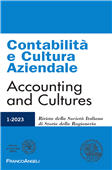Successes and crises in the joint-stock rail company Ferrovie Elettriche Abruzzesi (1929-1956)
61-86 p.
Introduction. This study analyses the economic and management trends of the company Ferrovie Elettriche Abruzzesi SA (FEA), the owner of the concession granted to build and use the Tavo railway from Penne to Pescara, and the tramway service in the city of Pescara from 1925 to 1956. Aim of the work. This study highlights how the management of concessionary companies of secondary railway lines is interconnected with the more general Italian problems of passenger and freight railway traffic management. Methodological approach. An analysis of the company's financial statements, the content of the reports by the technical bodies and the Internal Works Com- mittee, and the company's correspondence with stakeholders facilitated the reconstruction of all the internal and external causes of the crisis.
Main findings. The common denominator of the crisis was the associated and growing competition from road traffic and bus services, which led to increas- ingly poor operating results for FEA. The Penne-Pescara line had a low volume of traffic, which was part of the more general 'rail problem' that characterised Italy.nality. Delving into the interface of accounting and the history of local pub- lic transport, this study provides a case study of 'bad practice', which is rarely available in the scientific literature on corporate crises. [Publisher's text].
Forma parte de
Contabilità e cultura aziendale : rivista della Società Italiana di Storia della Ragioneria : XXIII, 1, 2023-
Artículos del mismo número (disponibles individualmente)
-
Información
Código DOI: 10.3280/CCA2023-001004
ISSN: 2283-7337


